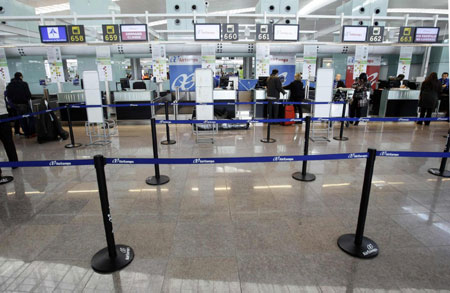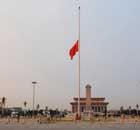Global General
EU to resume limited air traffic Tuesday
(Agencies)
Updated: 2010-04-20 03:36
 |
Large Medium Small |
BRUSSELS – European officials carved up the sky Monday, creating three zones to more quickly break the flight deadlock caused by volcanic ash flowing from Iceland over Europe. Many more flights will be able to take off on Tuesday, the bloc said.
|
 Passengers are seen at the departures terminal in Barcelona airport April 19, 2010. [Agencies] |
European countries can resume airline traffic in designated "caution zones" where the threat of ash is considered less dangerous, French officials said after a meeting of the bloc's 27 transport ministers.
| ||||
Jean-Louis Borloo, the No. 2 French Cabinet official, said flights in the caution zone will be "very secure" with many tests to make sure jet engines are not damaged by ash.
EU Transport Commissioner Siim Kallas said after a videoconference with EU transport ministers and industry officials that "the decision increases air space available to air traffic. This is the final outcome."
The EU said as of Tuesday morning "we should see more planes starting to fly."
Earlier, Germany's aviation authority granted Lufthansa an exemption to fly 50 long-haul planes carrying 15,000 passengers back home at a very low altitude and the British government sent Royal Navy warships to rescue those marooned across the Channel by flight cancelations.
Britain chimed in with more good news, saying flight restrictions over Scottish airspace will be lifted Tuesday morning at 7 a.m. (0600 GMT, 2 a.m. EDT) and other British airports could reopen later that day as well.
As airline losses spiraled over $1 billion, the aviation industry blasted European officials, claiming there was "no coordination and no leadership" in the crisis that shut down most European airports for a fifth day.
Eurocontrol, the air traffic agency in Brussels, said less than one-third of flights in Europe were taking off Monday - between 8,000 and 9,000 of the continent's 28,000 scheduled flights. Airports in southern Europe were open, however, and Spain offered to become an emergency hub for the whole continent.
Lufthansa spokesman Jan Baerwald said the planes, scattered around the world, would start getting ready "right now." The first flights will be from the Far East, with others following from Africa and North America
The planes will fly to Frankfurt, Munich and Duesseldorf under visual flight rules, he said, noting that air traffic control is still keeping its restrictions on German airspace.
"We have an exception that allows us to fly so-called visual flight rules," he said.
Visual flight rules allow a pilot to fly the airplane without reference to instruments, if weather conditions are good enough so the pilot can see landmarks and avoid any other aircraft. Those flights need to be under 18,000 feet, lower than usual altitude for commercial traffic.
In Iceland, meteorologists said eruptions from the volcano were weakening and the ash was no longer rising to a height where it would endanger large commercial aircraft. British Transport Secretary Andrew Adonis confirmed there was been a "dramatic reduction in volcanic activity."
Video still showed smoke billowing into the air from the volcano under the Eyjafjallajokull glacier.
Hundreds of thousands of passengers have been stranded around the world since the volcano in southern Iceland begun erupting Wednesday for the second time in a month. Passengers in Asia, frustrated over sleeping on airport floors for days and running out of money, staged protests at airport counters.
European airlines are seeking financial compensation for a crisis that is costing the industry at least $200 million a day - and by some industry estimates up to $300 million a day. The British Airways chief said test flights had proven that flying was safe.
Several airlines have run flights over the last few days, and none reported problems or damage, prompting some airline officials to question whether governments had overreacted to concerns that the microscopic particles of ash could shut down jet engines.
"It's embarrassing, and a European mess," said Giovanni Bisignani, chief executive of the International Air Transport Association. "It took five days to organize a conference call with the ministers of transport and we are losing $200 million per day (and) 750,000 passengers are stranded all over. Does it make sense?"
The IATA, world's leading airline industry group, expressed its "dissatisfaction with how governments have managed it, with no risk assessment, no consultation, no coordination, and no leadership."
British Airways said it had flown a plane Sunday through the no-fly zone and found "no variations in the aircraft's normal operational performance."
"The analysis we have done so far, alongside that from other airlines' trial flights, provides fresh evidence that the current blanket restrictions on airspace are unnecessary," BA chief executive Willie Walsh said Monday.
A senior Western diplomat said Monday that several NATO F-16 fighters had flown through the ash cloud, and one had suffered engine damage from glasslike deposits - evidence that the danger from the cloud is real.
The official declined to provide more details on the military flights and spoke on condition of anonymity due to the sensitivity of the information.








